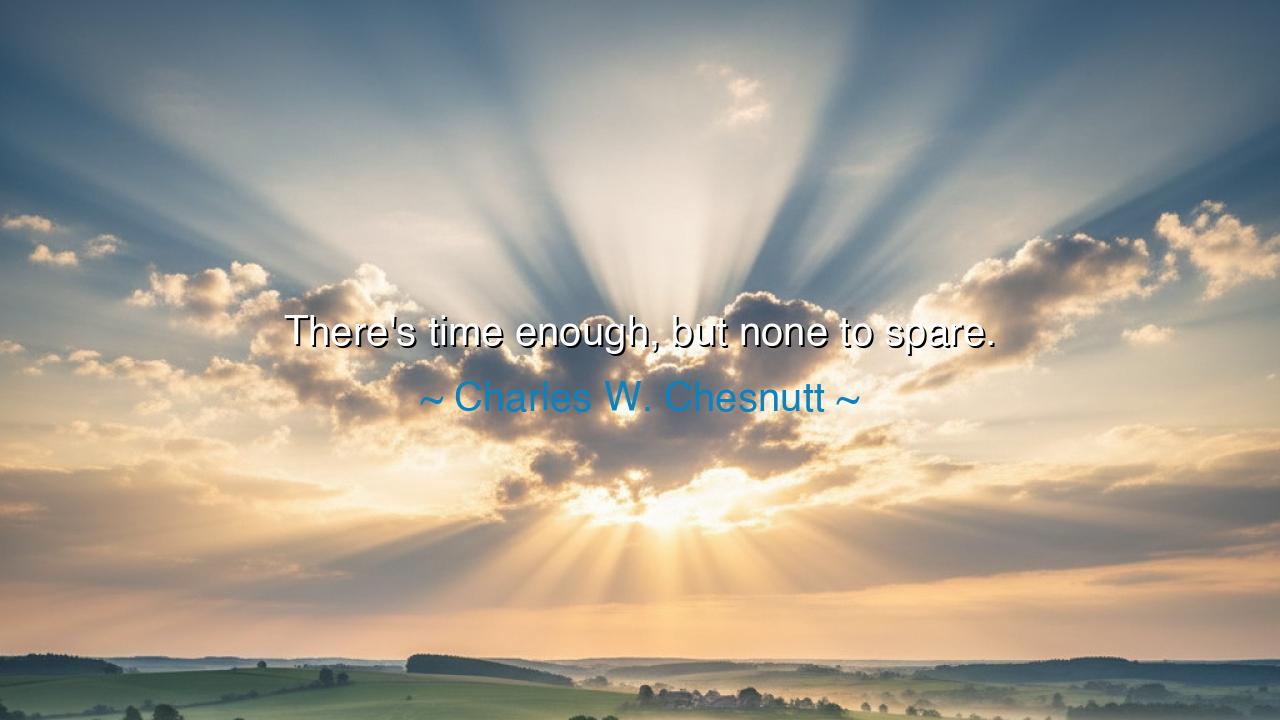
There's time enough, but none to spare.






The wise storyteller and thinker, Charles W. Chesnutt, once wrote with a voice that cut to the very marrow of human existence: “There’s time enough, but none to spare.” In these words lies a paradox that holds both comfort and warning. There is, indeed, sufficient time in life to do what is needful, to live with purpose, to accomplish the duties set before us. Yet there is no excess, no overflowing abundance to waste on idleness, vanity, or folly. Life gives us enough—enough to live fully, but not enough to squander.
The origin of this truth comes from Chesnutt’s experience as both a writer and a man who wrestled with the weight of history. Living in post-Civil War America, he was deeply aware of the fleeting opportunities afforded to those striving for progress amid hardship. He saw how precious time was, both for the individual and for a people seeking dignity and advancement. His words remind us that time is a treasure measured carefully—just enough to build, to grow, to love, but not so much that one can treat it lightly.
The ancients, too, understood this balance. Seneca, the Stoic philosopher, taught that life is long enough if it is rightly used, but too short if it is wasted. Marcus Aurelius reminded himself daily that every passing hour was one less given to him, and that it must be spent wisely. Chesnutt’s phrasing carries this same ancient wisdom into a new age: time is a measured gift, sufficient for greatness, but unforgiving if squandered. It is abundant enough for purpose, but scarce enough to demand reverence.
History gives us vivid examples. Consider Abraham Lincoln, who in just fifty-six years lived a life that altered the course of nations. He had “time enough” to preserve the Union, to strike the chains of slavery, to leave words of immortal power. Yet he had “none to spare,” for his life was cut short by an assassin’s bullet. Or think of Marie Curie, whose years of tireless research gave the world discoveries of light and medicine. She used her “enough” with brilliance, though at the cost of her own health, proving that time is not measured in length but in use.
The meaning of Chesnutt’s words is both urgent and empowering. They strip away the illusion that we have limitless days. We are not promised tomorrow, yet we are given today. We have enough time to live with love, to labor for justice, to create beauty, to grow in wisdom—but we do not have enough to indulge endlessly in distraction, pettiness, or delay. Every wasted moment is a theft from our own brief allotment.
Therefore, the lesson is clear: live with precision. Do not hurry through life in fear, but neither linger in wastefulness. Let each day be used with intention, as though it were both sufficient and scarce—because it is. When you speak, let it be with meaning; when you act, let it be with purpose; when you rest, let it be in true renewal. In this way, your life will be full, though your days are limited.
In practice, I counsel this: each morning, remind yourself that today holds enough time for what truly matters, but none to spare for what does not. Write down the few things that matter most and honor them with your time. Guard against the thieves of distraction, for they devour the hours. And when evening comes, ask yourself not “Was I busy?” but “Did I use my time for what endures?”
Thus, remember the wisdom of Charles W. Chesnutt: “There’s time enough, but none to spare.” Let it steady your heart, sharpen your will, and awaken your spirit. For life is not too short to live greatly—but it is too short to live carelessly.






AAdministratorAdministrator
Welcome, honored guests. Please leave a comment, we will respond soon